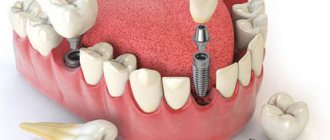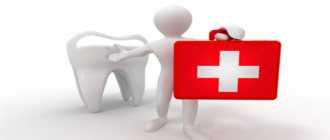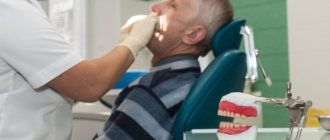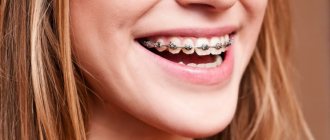Old age is not a reason to deny yourself the pleasure of living life to the fullest, eating well and smiling without embarrassment. Unfortunately, a pension does not always allow you to use all the possibilities of modern dentistry, because many services cost a lot. The “Two Dentists” clinic in St. Petersburg offers dental prosthetics for pensioners at a discounted price and with the possibility of partial reimbursement of costs. We use modern technologies that are suitable for older people and provide complete restoration of chewing function and smile aesthetics.
Features of the service
Dental prosthetics for elderly patients requires a special approach from the dentist. In the process of choosing a method for restoring elements of the dentition, it must take into account a lot of specific features:
- lack of a large number of teeth: often older people turn to the dentist only when almost all their teeth are lost or are in poor condition;
- bone tissue atrophy and sparseness due to osteoporosis;
- the presence of concomitant diseases that limit the possibilities of surgical intervention and the use of anesthesia.
Often you also have to choose an option that will be comfortable in cost, because not all older people can afford to spend a large amount on dental care, even the most modern one.
If your health condition does not allow you to wait in line
The law describes exceptional cases when teeth are installed free of charge and urgently. This rule applies to people with serious illnesses.
These include:
- malignant changes in some organs (hematopoietic, for example);
- oncological lesions of the digestive system, jaw;
- complex surgical intervention in the gastrointestinal tract;
- trauma resulting in complete or severe loss of teeth.
In order to have teeth inserted urgently and free of charge, you must provide certificates and extracts from the hospital proving the exceptional circumstances.
Types of dental prosthetics for pensioners
The capabilities of modern dentistry have made it possible to step far beyond the level of uncomfortable removable dentures, which have long been considered an invariable attribute of an elderly person. Now neither age, nor complete edentia, nor long-term absence of teeth with bone atrophy are limitations for orthopedists. Our clinic offers comfortable and at the same time affordable prosthetic methods that provide excellent results in terms of aesthetics and functionality.
Acrylic dentures
This is the most budget-friendly type of removable dentures, the basis for which is durable and lightweight acrylic. The product is made to individual measurements, has a natural appearance and is securely fixed in the oral cavity. The prosthesis is easy to remove for hygiene purposes, easy to clean and just as easy to put on. To monitor the condition of the oral cavity, preventive dental examinations twice a year are sufficient.
Nylon dentures
Unlike completely rigid acrylic models, this version of the prosthesis has a flexible base that carries crowns made of durable plastic. Due to its softness, the structure is easily fixed on the gums due to the resulting vacuum, does not injure soft tissues and provides maximum comfort for the patient. The product is as easy to take off and put on as an acrylic prosthesis.
Clasp dentures
The structures are classified as conditionally removable. The attachment is not permanent, but only a dentist can remove or put on the prosthesis. Classic models are metal fasteners (hooks, arches, staples), which serve as the basis for prostheses made of ceramic or plastic. Healthy or pre-ground teeth serve as the basis for fixing the prosthesis. The main advantages of such models are strength and naturalness. Cleaning is done with a regular toothbrush.
Non-removable metal-ceramic products
Most often, prostheses of this type are installed on a depulped and ground tooth with a intact root, with significant destruction of its coronal part. The basis of the product is a durable metal frame, onto which a layer of ceramic is applied that imitates enamel. The finished prosthesis has sufficient strength for long service and a decent appearance. In addition to individual crowns, metal ceramics can be used to make bridges. In this case, one or more elements are fastened together and fixed on the ground healthy teeth along the edges of the defect.
The choice of prosthetic technique depends on the patient’s age, oral condition, number of remaining teeth, concomitant diseases and preferred price range.
Kinds
The MY ORT clinic offers patients a choice of soft prostheses, metal-ceramic crowns and bridge structures.
Plastic structures often cause allergic reactions, so we do not recommend installing them. We advise you to consider other design options.
The following materials are used to make prostheses:
- acrylic (inexpensive dental prosthetics for pensioners made from acrylic) - strong, resistant to destruction, but the porosity of the surface allows it to absorb odors and moisture;
- nylon is a hypoallergenic structure made of a flexible lining on the gums on which plastic crowns are attached. Attaches to teeth using clasps. Set in case of loss of 3 or more units in a row.
Acrylic dentures are inferior to nylon ones in the following indicators:
- flexibility;
- comfort;
- care;
Clasp structures are a combined prosthesis made of metal and acrylic. It is distinguished by the greatest aesthetics, reliability and durability.
The advantages of such a prosthesis:
- naturalness;
- aesthetics;
- reliability of fastening;
- cleaned with a toothbrush.
Metal-ceramic structures are used for fixed prosthetics. They are separate bridges and crowns connected by a ceramic-coated metal base.
They are worn on living teeth (depulped and ground) or, in the absence of such, on titanium implants.
Stages and timing of prosthetics
Dental prosthetics follows a standard scheme, consisting of several stages:
- preliminary consultation: the doctor examines the oral cavity, assesses the condition of all its elements, takes x-rays and/or tomograms, voices and explains to the patient all the options and draws up a treatment plan;
- oral cavity sanitation is performed: professional teeth cleaning, treatment of caries, periodontal disease, gingivitis and other acute diseases;
- grinding of teeth if necessary;
- taking impressions of the oral cavity and transferring them to a dental laboratory for the manufacture of a prosthesis;
- preliminary fitting of the design; at this stage it is possible to re-transmit it to dental technicians for revision if the patient experiences discomfort;
- final installation of the prosthesis, teaching the patient how to care for the product.
The timing of dental restoration depends on the initial state of the oral cavity, the amount of preparation and the chosen prosthetic technique.
Price
The cost of dentures for pensioners and veterans is calculated individually, depending on the chosen technique and consumables, as well as the amount of work to prepare the oral cavity. We offer elderly people special prices for all services, as well as the opportunity to receive government compensation for treatment in the form of a tax deduction.
To qualify for a partial refund of the cost of prosthetics, you must:
- find out if it is possible to obtain a certificate at our clinic;
- issue a payment to any working relative;
- collect the necessary documents: receipts for payment, a declaration, a copy of the clinic’s license and an agreement for the provision of prosthetic services.
If everything is assembled correctly, the relative will receive a tax deduction, which is 13% of the cost of the prosthesis itself and the doctor’s work.
The times when older people were forced to hide their smile due to missing teeth are long gone. Today, installation of modern, comfortable and beautiful prostheses is available to everyone. Call and make an appointment at the Two Dentists clinic - take the first step towards the smile of your dreams.
Who is eligible for government support?
The right to preferences is laid down in the relevant legislative act, which interprets the concept of a preferential category.
The list of persons receiving subsidies for free prosthetics can be divided into federal and regional.
Federal beneficiaries include:
- officers dismissed upon reaching the age limit for military service, for health reasons, in connection with regular activities, with length of service and members of their families;
- military personnel and citizens who are called up for military training, employees of internal affairs bodies, police, employees of the penal system, fire service, and customs authorities with special ranks;
- persons holding the title of Hero of the Soviet Union, Hero of Russia, Hero of Socialist Labor, Hero of Labor, full holder of the Order of Glory, full holder of the Order of Labor Glory;
- citizens of Russia who were dismissed from service in the internal affairs bodies and became disabled due to injury, other damage to health in connection with the performance of official duties, or a disease received during service.
The list of regional beneficiaries varies depending on the region of residence, since it is regulated exclusively by regional legislation and is sponsored by the budget of the corresponding region.
For example, in Moscow the following can count on denture benefits:
- pensioners, disabled people, disabled children, labor veterans;
- home front workers;
- honorary donors;
- mothers of many children who gave birth and raised 5 or more children.
In St. Petersburg, the following can take advantage of the benefit:
- home front workers;
- labor veterans;
- rehabilitated persons and persons who suffered from political repression;
- pensioners;
- visually impaired people of group I or II, disabled people missing both legs and/or both arms, or with paralysis of two or more limbs, or missing an arm and a leg;
- honorary donors;
- military veterans;
- women who have been awarded the honorary title “Mother Heroine” and women who have given birth and raised 10 or more children;
- pensioners who have worked in St. Petersburg (Leningrad) for at least 20 years and have a work experience (in calendar terms) of at least 45 years for men and 40 years for women, excluding periods of work performed by convicts held in correctional institutions and prisons;
- widows (widowers) of Heroes of Socialist Labor and full holders of the Order of Labor Glory (regardless of the date of death (death) of the Hero of Socialist Labor or full holders of the Order of Labor Glory).
In the Perm Territory, the provision of medical care for dental prosthetics within the framework of the voluntary health insurance program is guaranteed to the following persons:
- labor veterans and persons equivalent to them;
- home front workers;
- rehabilitated persons;
- persons recognized as victims of political repression.
In the Krasnodar Territory, benefits for dental prosthetics are provided:
- victims of political repression;
- home front workers;
- labor veterans.
Regional features
It is recommended to clarify specific data on the categories of citizens eligible for budget funding from the local administration (social protection department).
Some regions provide benefits for dental prosthetics to the following beneficiaries:
- citizens whose average family income is significantly below the subsistence level;
- liquidators of accidents at nuclear facilities (Chernobyl victims and persons equivalent to them);
- in some regions: home front workers;
- pensioners of the Ministry of Internal Affairs;
- military pensioners (with more than 25 years of service);
- honorary donors of the USSR and the Russian Federation;
- heroes of the Soviet Union and the Russian Federation;
- repressed.
People who doubt whether they will be included in benefits should better find out the details from civil servants in local government structures. Legislation is different everywhere.
For example, in Kamchatka prosthetics are provided free of charge to all members of a family raising a disabled child.










